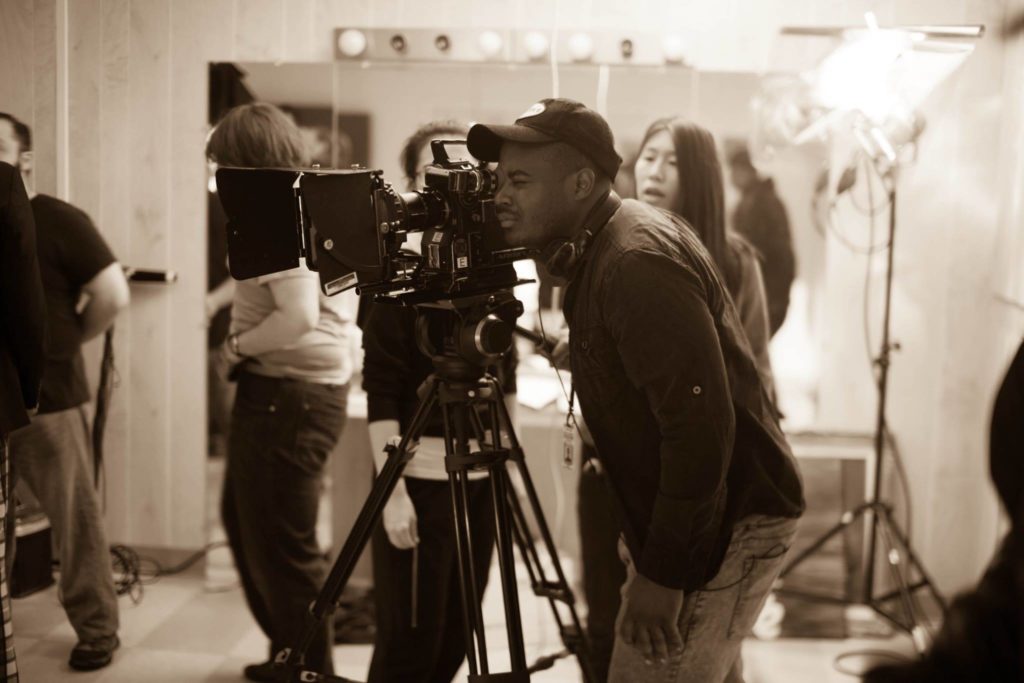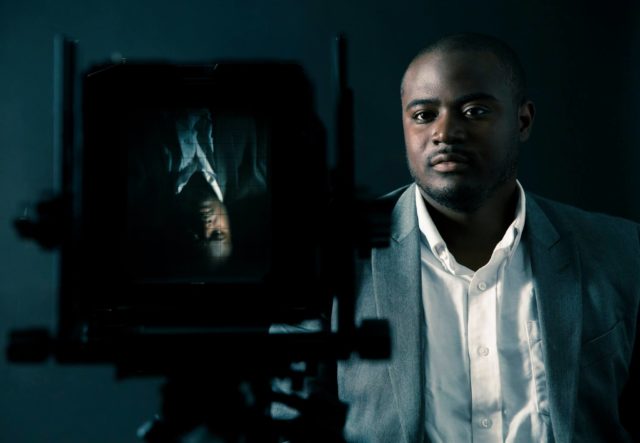By Solomon Crenshaw Jr.
For the Birmingham Times
Fact might seem stranger than fiction if a young Jamel Lajuan, born Jamel Lajuan Jackson, could see himself now.
“I’m a totally different person than I was in high school,” the Minor High School grad said.
Back then, Jackson was a bookworm, a strong academic student who was more likely known as a running back on the Tenacious Tigers football team. A decade and a half after graduation, his playing field is not the gridiron but instead the silver screen.
Jackson’s first feature production—the documentary “Iron Grit,” which examines the transition of Birmingham from a city in the Jim Crow South to a progressive municipality that would elect its first black mayor—could premiere this summer. The film focuses on the shooting death of Bonita Carter, an unarmed black woman, at the hand of a white Birmingham police officer. The incident, which marked its 40th anniversary on June 22, was the catalyst to Richard Arrington beginning a 20-year term as mayor.
“I would be amazed that I would have stuck with such a marathon of a project for so long and seen it through,” Jackson said. “I would be amazed at my perseverance. When I was younger, I would get started on something, and I might not necessarily have finished it, unless it was something very short-term.
“If it was anything challenging, I would kind of put it off and make it easier on myself. But what I’ve learned with maturity and life experience is it takes letting things breathe, letting things play out, trusting the process, and sticking with it. I made an effort the last several years of my life to stick with whatever I started.”
The Arrington Story

As he began researching stories in Birmingham, Jackson stumbled upon the story of Arrington. He knew Arrington had been mayor, but he didn’t know the rest of the story. He would learn that the deaths of young blacks at the hand of uniformed whites happened well before the 2012 Sanford, Fla., shooting death of Trayvon Martin. And he would find that he wasn’t the only one who didn’t know about it.
“It’s been going on since the beginning of America, really,” Jackson said. “That’s the main thing, and how easily people can be forgotten. I feel like the whole city has forgotten about this story. I can’t tell you how many people I talked to who didn’t know any of this stuff happened, and they’ve lived here all their life. How does that happen?”
The film’s synopsis tells of a friendship between black city councilman Arrington and white councilman David Vann. In 1975, Arrington greatly assisted Vann in Vann’s campaign to become mayor. In the mid-1970s, Birmingham faced multiple cases of police brutality, and Arrington took action as a city councilman to combat the problem. As a result, he gained a strong following from liberal whites and blacks.
Bonita Carter Shooting
Bonita Carter, a 20-year-old unarmed black woman, was shot and killed by Birmingham Police Officer George Sands. The incident led to multiple racially charged protests and counter-protests. Mayor Vann backed the police officer, which put him and Arrington on opposite sides of the issue. The Bonita Carter incident moved Arrington to run for mayor.
“I didn’t know all the stuff about Bonita Carter, police brutality, David Vann,” Jackson said. “My jaw was dropping. How could I not know about this?”
Interviewees told Jackson what he had not found in his research. He discovered that no one had ever talked to them about what had transpired.
“People started getting interested in it, and the word starts getting around,” he said. “This film is happening. It kind of grew from there and got bigger and bigger. I was like, ‘I’ll do it. If I’m not going to do it, who will?””
20 Interviewed
Twenty people were interviewed in the one-hour-46-minute film. Interviews began in March 2016 and were completed in February of this year. Interviewees include Arrington, his former wife Rachel Arrington, former Birmingham City Councilman David Herring, and activist Bishop Calvin W. Woods, as well as residents Hezekiah Jackson and Rickey Smiley, and Myrna Carter Jackson, a relative of Bonita Carter.
Recently retired Birmingham Police Chief A.C. Roper was interviewed, too, but police of that era, including the son of Officer George Sands, declined to talk.
“[He] didn’t want to be any part of the film,” Jackson said. “He’s afraid of backlash. There were three officers there who didn’t want to be interviewed unless all three of them were together. It didn’t happen because the production schedules didn’t work out.”
Former Child Actor
Jackson, 33, began his career on the other side of a camera. He was a child actor in some local and regional TV commercials and a model in some ads. The
filmmaker is the son of a sports coach: his father, James Jackson, won a state basketball championship as the coach of Holy Family, a small-school power in the 1980s. The younger Jackson attended Thompson Middle School, while his father was a coach at Alabaster’s Thompson High School. The family moved to Adamsville, and Jamel went to Minor High School when his dad, also a history teacher, joined the football coaching staff there.
Marlan Pinkins, one of Jackson’s high school friends, recalled, “I know he used to study a lot. He was one of the smart kids. He focused on his books. He was kind of quiet. Everybody knew him, mainly because of his dad and his sister. He didn’t really stand out too much.”
Lajuanda Harvey, of Helena, remembers her son Jamel playing football at Minor. He was “just part of the team,” she said, recalling that he did score some touchdowns in high school. Jackson played with the likes of Darius McClure and Tyrone King, who played collegiately at Florida State University and the University of Alabama, respectively.
“He wasn’t the main one, but he did contribute a lot to it,” Harvey recalled.
Jackson played well enough to have a highlight reel from his playing days at Minor and then play a season at Kentucky Wesleyan College. He acknowledges the influence of his father on his interest in sports, as well as his interest in history.
“He would always quiz me on history,” Jackson said. “That was like an everyday speech, everyday talk. When we had downtime, we would talk about history.”
His mother envisioned her son being a future politician.
“He was so into history and so into what was going on with the politics at that particular time,” Harvey said. “I actually thought he would run for some kind of office.”
Interest in Politics
Despite having been pushed to run for student government offices, Jackson lacked the drive to be a politician, but the interest was there.
“That’s kind of why I like film,” he said. “I’m able to channel that interest that I do have in politics without having to be full-blown into it. I believe Steven Spielberg said film directors are really just sly politicians. I never felt like I wanted to be full-blown into politics, but I like to address social issues.”
Jackson’s path to working behind the camera took several turns. After a season of football at Kentucky Wesleyan, he stepped away from the gridiron to focus on his academics.
“I got the game-winning catch in my last football game, and that was it for me,” said Jackson, who at the time was a pre-med major with an eye toward becoming an orthopedic surgeon.
From there, he played baseball at Fisk University, then transferred to the University of Alabama and dropped out after two semesters. His parents divorced in 2010, and he moved to northern California with his father for a year.
“I didn’t really make it there,” he said. “I didn’t really like northern California, [so] I came back to Alabama in 2011. That’s when I joined the military. Charlie [Harvey], my stepdad, was always in my ear: ‘You should join the military. You’re an adult now. You’re a grown man.’ Charlie really pushed me to grow up.”
The National Guard
Jackson joined the National Guard in 2011 and returned to the University of Alabama in 2012 as part of the Reserve Officers’ Training Corps (ROTC) program. A week into his first semester, his Guard unit was sent to Afghanistan, where he served in 2013 and 2014. He took online classes in his downtime and nearly had his bachelor’s degree done by the time his tour was done. When he returned to the U.S., he moved to Atlanta, Ga., where he took a job in security at a hotel.
It “really wasn’t working out for me,” Jackson said—but it opened a door to his return to film.
A film crew staying at the hotel was filming the second season of the Starz cable and satellite television network show “Survivor’s Remorse.” A conversation with a crew member led Jackson to become a production assistant.
“It’s the lowest position you can get, but it gets you a foot in the door,” he said. “In Afghanistan, I had kind of decided I wanted to get back into film, but I was kind of hesitant because I hadn’t been in it since I was a kid.”
Tyler Perry TV
After working on episodes of the Tyler Perry television show “If Loving You Is Wrong” in 2015, Jackson was advised to move to Los Angeles, Calif. “Everything goes through L.A.,’” he was told.
The Alabama native enrolled in the master’s program of the New York Film Academy in Burbank, Calif., aiming to become a producer, but he became the person who directed all the student films. Jackson had found his niche, directing about 12 projects in one year of film school. His 13th was a short version of “Iron Grit,” which he did for his thesis, based on a professor’s suggestion that something based on his hometown would be a good launching pad.
Jackson recalled the professor saying, “Even if you don’t have a career, do stories about where you’re from. Let that be your starting point. That’s where you’re going to have the most knowledge, where you’re going to have the most experience, where you’re going to have the better feel for the story.”
“Iron Grit” could premiere at the Birmingham Sidewalk Film Festival in August; the festival lineup will be released soon. Solomon Crenshaw Jr. is among those interviewed for the documentary.
Updated on 6/30/2019 at 11:16 a.m. at the request of the filmmaker to use his middle name as his last name.




